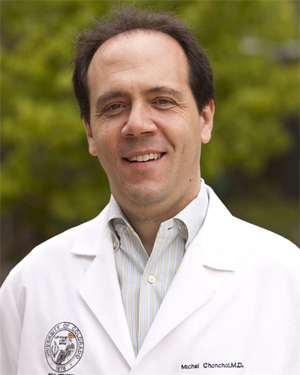Q&A: Michel Chonchol
Professor Michel Chonchol, M.D., received his medical training at the Universidad Central de Venezuela in Caracas. He did his internship and residency programs at the University of Texas at Houston. In 1997, Dr. Chonchol initiated a fellowship in Nephrology at the University of Colorado School of Medicine. Since 2008, he has served as the Director of Clinical Research in the Division of Renal Diseases and Hypertension. In 2012, he was promoted to professor and has served as Director of the End Stage Renal Disease program since 2013.
1. How did you become interested in science and medicine?
While in high school I enjoyed biology and science. I had the fortune of having good teachers and mentors who steered me toward medicine.
2. What interested you in the career path you have chosen (academia)?
Academia offers many opportunities, which include taking care of patients, medical research and teaching/mentoring younger generations of physician-scientists. It truly is one of the best professions in the world.
3. Is there a teacher or mentor who helped shape your career?
Dr. Tomas Berl. I was a fellow under him while he was the division head. He is one of the brightest people I have met in academic medicine.
4. How would you describe your professional interests?
The overall goal of my research is to explore traditional and nontraditional risk factors in patients with kidney disease that could explain the high rate of death and cardiovascular events as well as kidney disease progression observed in this patient population. The risk factors that we have focused include: abnormalities of mineral metabolism, hypertension, fatty liver disease and vascular disease.
5. Why did you choose the University of Colorado?
My mentor (Dr. Tomas Dubose) at the University of Texas-Houston, who was the division head of Nephrology, knew that I had lined up interviews on both East and West Coasts. He suggested that I should to go Denver because of the long-standing academic tradition of the Nephrology program at the University of Colorado. This Nephrology training program has always had an outstanding clinical and research program.
6. What kinds of professional opportunities or advantages does being a faculty member at an academic medical center provide?
Relationships both on this campus as well as nationally and internationally. Because you are an expert in a specific disease state, you are asked for your opinion and you can consult with other colleagues as well as national peers.
7. If you could change one thing about the world of medicine what would it be?
Regulations – medicine has changed to include more restrictions and rules. More hurdles to jump over for both research and clinical medicine. It is an art to cultivate the excitement to be a physician-scientist; however, the rules and regulations can be at times somewhat discouraging.
8. What do you see as “the future” of medicine?
The future of medicine will bring new advances in the diagnosis and therapeutics of chronic diseases. We must continue to be optimistic about the future and follow the passion in our hearts of making a difference in the lives of patients.
9. What are some of your outside interests?
I enjoy spending time with family and outdoors activities.


